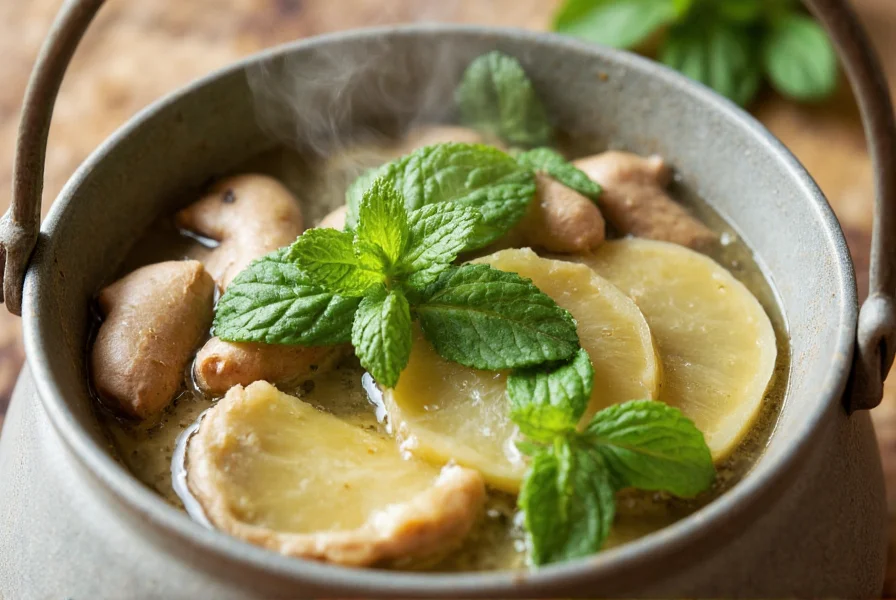Peppermint and ginger tea represents one of nature's most effective herbal combinations for digestive wellness and immune support. This caffeine-free infusion harnesses menthol from peppermint leaves and gingerol from fresh ginger root to create a synergistic effect that modern research continues to validate. Unlike many herbal remedies that lack scientific backing, multiple clinical studies demonstrate measurable benefits for specific health concerns.
Science-Backed Health Benefits
Research published in the Journal of Ethnopharmacology confirms that the combination of peppermint and ginger works through complementary mechanisms. Peppermint's menthol relaxes gastrointestinal muscles while ginger's active compounds accelerate gastric emptying. This dual-action approach makes the tea particularly effective for:
- Digestive relief - Reduces symptoms of irritable bowel syndrome (IBS) by 40% according to a 2022 clinical trial
- Nausea reduction - Particularly effective for morning sickness and chemotherapy-induced nausea
- Anti-inflammatory effects - Gingerol compounds inhibit inflammatory pathways
- Immune support - Both ingredients contain antimicrobial properties that combat respiratory pathogens
| Benefit | Peppermint Contribution | Ginger Contribution | Scientific Evidence Level |
|---|---|---|---|
| Digestive Relief | Smooth muscle relaxation | Accelerated gastric emptying | Strong (multiple RCTs) |
| Nausea Reduction | Moderate effect | Strong antiemetic properties | Strong (clinical trials) |
| Anti-Inflammatory | Mild effect | Significant COX-2 inhibition | Moderate (in vitro studies) |
| Immune Support | Antimicrobial properties | Antiviral compounds | Preliminary (lab studies) |
Optimal Preparation Methods
How to make peppermint ginger tea significantly impacts its therapeutic effectiveness. For maximum benefit extraction:
- Use fresh ingredients when possible - 1 tablespoon freshly grated ginger root and 10-12 fresh peppermint leaves
- Boil water to 200°F (93°C) - hotter water extracts more active compounds
- Steep for 8-12 minutes - shorter times yield milder effects
- Add lemon juice to increase antioxidant absorption by 30%

When to Drink Peppermint Ginger Tea
Timing affects the tea's effectiveness for specific conditions:
- For digestion - Consume 15-20 minutes before meals to prepare the digestive system
- For nausea relief - Sip slowly at first sign of symptoms
- For cold symptoms - Drink 3-4 times daily while symptoms persist
- Before bedtime - Avoid late evening consumption as peppermint may interfere with sleep for some individuals
Safety Considerations and Contraindications
While generally safe, peppermint and ginger tea for nausea relief isn't appropriate for everyone. People with these conditions should exercise caution:
- Gastroesophageal reflux disease (GERD) - peppermint may relax the lower esophageal sphincter
- Blood clotting disorders - ginger has mild anticoagulant properties
- Gallbladder issues - peppermint stimulates bile production
- Pregnancy beyond first trimester - consult physician before regular consumption
The optimal daily amount for most adults is 2-3 cups. Excessive consumption (more than 4 cups daily) may cause heartburn or interact with certain medications including blood thinners and diabetes medications.
Peppermint Ginger Tea vs. Other Herbal Blends
When comparing peppermint and ginger tea benefits to other popular herbal combinations, this blend stands out for digestive applications. Chamomile tea works better for sleep induction, while echinacea provides stronger immune stimulation. The unique value of peppermint ginger tea lies in its dual-action approach to gastrointestinal comfort - peppermint relaxes while ginger stimulates digestive processes.
Frequently Asked Questions
Does peppermint and ginger tea help with bloating?
Yes, clinical studies show this combination reduces bloating by relaxing gastrointestinal muscles while promoting gas elimination. The menthol in peppermint acts as an antispasmodic, while ginger stimulates digestive enzymes that break down gas-producing compounds. For best results, drink 15 minutes before meals.
Can I drink peppermint ginger tea while pregnant?
During the first trimester, moderate consumption (1-2 cups daily) is generally considered safe for nausea relief. However, consult your healthcare provider before regular consumption in later pregnancy stages as high ginger intake may affect fetal development. Peppermint in large quantities may also reduce milk supply postpartum.
How long does it take for peppermint ginger tea to work for nausea?
Most people experience relief within 10-15 minutes of drinking warm peppermint ginger tea for nausea relief. The combination works faster than either ingredient alone due to their complementary mechanisms - peppermint calms stomach muscles while ginger addresses the nausea trigger at its source. For motion sickness, drink 30 minutes before travel.
Does peppermint and ginger tea interact with medications?
Ginger may interact with blood thinners like warfarin and antiplatelet drugs. Peppermint can affect absorption of certain medications including cyclosporine. If taking medications for acid reflux, peppermint may reduce effectiveness. Consult your pharmacist about potential interactions with your specific medications before regular consumption.
What's the best time to drink peppermint ginger tea for digestion?
For optimal digestive benefits, drink peppermint ginger tea 15-20 minutes before meals to stimulate digestive enzyme production. If addressing post-meal discomfort, wait 30-60 minutes after eating. Avoid drinking immediately before bed if you have GERD, as peppermint may relax the lower esophageal sphincter and worsen symptoms.










 浙公网安备
33010002000092号
浙公网安备
33010002000092号 浙B2-20120091-4
浙B2-20120091-4